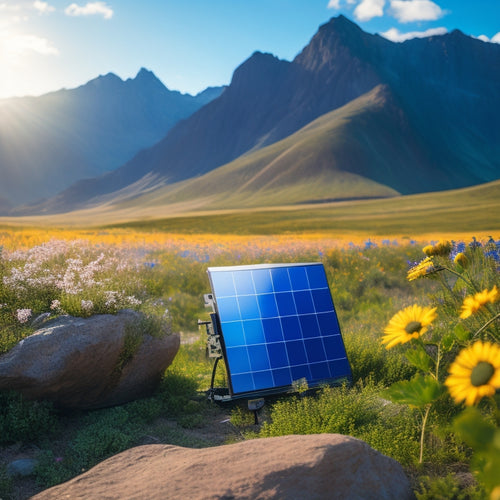
Top Picks for Camping Off-Grid Energy Solutions
Share
When venturing off-grid, you'll need a reliable energy solution that can keep up with your power demands, and selecting the right combination of portable solar panels, camping batteries, and energy storage options is vital for a successful and sustainable camping experience. Efficiency, durability, and water resistance are key considerations for solar panels, while battery capacity, charging efficiency, and reliability are essential for camping batteries. With various energy storage options like deep-cycle batteries, lithium-ion batteries, and capacitors, choosing the right one depends on factors like capacity, depth of discharge, and charging/discharging rates. As you investigate off-grid energy solutions, understanding these important factors will help you make informed decisions to power your next expedition.
Key Takeaways
- High-efficiency monocrystalline solar panels are recommended for off-grid power due to their superior energy output.
- Deep cycle batteries are ideal for frequent charge/discharge cycles and are suitable for solar applications.
- Lithium-ion batteries offer high energy density and longevity, making them a reliable choice for off-grid camping.
- Wind and hydro power are sustainable alternatives to fossil fuels, ideal for campsites with windy or water-rich environments.
- Assessing energy needs and selecting the right battery capacity, type, and charging efficiency is crucial for a reliable off-grid energy solution.
Portable Solar Panel Systems
Portable solar panel systems have become increasingly popular among campers and outdoor enthusiasts, allowing you to harness the power of the sun to charge your devices and power your equipment.
When selecting a portable solar panel system, take into account the solar panel efficiency, which determines how much energy is generated per hour of sunlight. High-efficiency monocrystalline panels like Renogy 400W Kit are recommended for off-grid power. Look for panels with high efficiency ratings to maximize your energy output.
Other key portable panel features to keep in mind include durability, water resistance, and foldability for easy storage and transport. Additionally, assess the power output and voltage requirements of your devices to verify the panel can meet your energy needs.
Camping Battery Power Solutions
As you venture off the grid, having a reliable camping battery power solution is essential to keeping your devices charged and your equipment running.
When selecting a battery, consider the battery capacity, which determines how long your devices stay powered. Look for batteries with high capacity ratings, usually measured in ampere-hours (Ah).
Evaluating your specific energy needs is imperative, as 85% of RV owners underestimate their power needs, and effective battery sizing is critical for maximizing power usage.
Charging efficiency is also significant, as it affects how quickly your battery recharges. Opt for batteries with high charging efficiency to minimize downtime.
Additionally, consider the type of battery, such as lead-acid, lithium-ion, or deep-cycle, each with its own strengths and weaknesses.
Off-Grid Energy Storage Options
Several off-grid energy storage options are available to suit your camping needs, each with its unique benefits and limitations.
You can consider deep cycle batteries, designed to handle frequent charge and discharge cycles, ideal for wind energy systems or fuel cells. Deep cycle batteries are specifically designed for steady energy flow, making them suitable for solar applications. They efficiently manage energy storage, allowing for the use of excess energy at night or during low sunlight conditions.
Lithium-ion batteries offer high energy density and long lifetimes, but at a higher cost. Lead-acid batteries provide a more affordable option, although they're heavier and less efficient.
You may also look into capacitors, which store energy through electrostatic fields, suitable for short-term power backup.
When choosing an energy storage solution, consider factors like capacity, depth of discharge, and charging/discharging rates to guarantee a reliable power supply for your camping excursions.
Solar Generator Systems Compared
When you're planning an off-grid camping trip, you'll want to weigh the pros and cons of different solar generator systems to power your expedition.
Key considerations include solar generator efficiency, which affects how much power you can generate per hour of sunlight. Look for systems with high-efficiency panels and inverters to maximize your energy output.
Another essential factor is generator maintenance tips, such as regularly cleaning the panels and checking the battery state of charge. Some systems also offer built-in monitoring and control systems, making it easier to track performance and identify issues.
Renewable Energy for Camping
You've considered the pros and cons of different solar generator systems, now it's time to examine the broader world of renewable energy for camping.
Renewable energy solutions offer a cleaner, more sustainable alternative to traditional fossil fuels. Beyond solar power, wind energy and hydro power are viable options for camping.
Wind energy utilizes the power of wind using turbines, which can be installed in windy areas. Hydro power, on the other hand, exploits the energy of moving water, making it suitable for campsites near rivers or streams.
Both options can be used to charge batteries or power appliances directly. When choosing a renewable energy solution, consider your camping location, energy needs, and the equipment's durability and maintenance requirements.
Frequently Asked Questions
How Do I Protect My Off-Grid Energy System From Theft?
You'll want to implement strong security measures to safeguard your off-grid energy system from theft, such as locking energy storage units, using tamper-evident devices, and installing surveillance cameras to deter potential thieves and protect your investment.
Can I Use Off-Grid Energy Solutions in Extreme Weather Conditions?
Coincidentally, your off-grid energy system's reliability is put to the test in extreme weather conditions. You'll want to guarantee your energy storage is sturdy, using high-quality batteries and protective casings to withstand torrential rains, scorching heat, or freezing temperatures.
Are Off-Grid Energy Solutions Environmentally Friendly?
You're wondering if off-grid energy solutions are environmentally friendly. They typically utilize renewable resources, promoting energy efficiency and reducing carbon footprints. By leveraging solar, wind, or hydro power, you'll minimize your impact on the environment, ensuring a cleaner, greener future.
Can I Charge My Electric Vehicle With Off-Grid Energy?
As you venture into the wilderness, you're wondering if you can charge your electric vehicle (EV) off the grid. Fortunately, yes, you can, using portable solar panels, battery-powered EV chargers, or even wind turbines to capture renewable energy for EV charging.
Are Off-Grid Energy Solutions Compatible With All Camping Gear?
You'll need to check your camping gear's power requirements to confirm off-grid energy solutions are compatible, considering factors like voltage, wattage, and ampere ratings to secure seamless integration and efficient energy supply.
Related Posts
-

How to Achieve a Zero-Waste Lifestyle for a Greener Tomorrow
To achieve a zero-waste lifestyle, start by adopting the principles of refusing, reducing, reusing, and recycling. Sw...
-

Replacing Old Appliances With Sustainable Alternatives
Replacing old appliances with sustainable alternatives can change your home into an energy-efficient space. Not only ...
-

High-Efficiency Solar Battery Chargers for Remote Areas
High-efficiency solar battery chargers are essential for your off-grid energy needs in remote areas. They maximize en...


